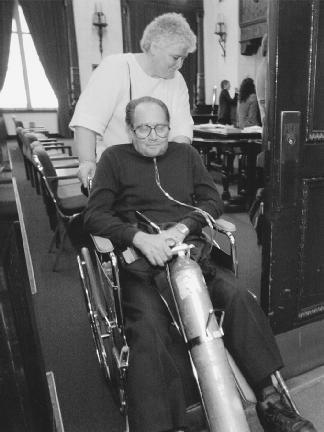Emphysema - Treatment
Once emphysema has developed, there is no way to cure the disease or reverse the damage it has done. However, there are many steps that can be taken to slow the progress of the disease, make the patient more comfortable, and prevent the worst complications of the condition.
The first step is for the patient to stop smoking. Unless the patient makes this decision, his or her condition will only continue to get worse. Further treatment can do relatively little to relieve the symptoms of the disorder.
Special exercises may be prescribed for the patient. One objective of these exercises is to keep the lungs healthy and free of infection. Another goal is to develop the muscles used in breathing.
Bronchodilators (pronounced brong-ko-die-LATE-urs) are sometimes used to help relieve the symptoms of emphysema. Bronchodilators are substances that help tissue relax. They assist airways in opening up to allow air to travel more easily through the lungs. Antibiotics may also be used to reduce the risk of lung infections.
In later stages of the disease, oxygen therapy may be necessary. Oxygen therapy consists of providing patients with an extra supply of oxygen, usually through a nose or face mask. The additional oxygen helps the heart to work more easily and reduces the stress that can lead to heart disorders.
Volume reduction surgery is increasingly used to treat emphysema. In volume reduction surgery, damaged portions of the patient's lung are removed. The procedure makes it easier for the patient to use healthy parts of the lung to get the oxygen needed for ordinary functioning.

A treatment of last resort is a lung transplant. In a lung transplant, a healthy lung is removed from a donor and used to replace the damaged lung of an emphysema patient. The procedure is very risky. In addition, there are seldom enough lungs available for transplant to meet the needs of all patients who want them.
Alternative Treatment
Alternative treatments are most valuable when they are used in conjunction with traditional medical care. Aromatherapists may use a variety of oils to make breathing easier. These oils include eucalyptus (pronounced YOOK-ahlip-tus), hyssop (pronounced HEYE-sop), aniseed, lavender, pine, and rosemary. The Chinese herb ephedra (pronounced EF-ed-ra; called ma huang in Chinese) is regarded as a bronchodilator, but it should not be used by patients with heart disorders or high blood pressure. Several herbs, such as elecampane (pronounced EL-i-cam-pane), may help patient's clear mucus from the lungs. Mullein (pronounced MULL-en) tea is recommended to soothe the linings of the lungs. Yoga may be helpful in improving a patient's breathing techniques.

Comment about this article, ask questions, or add new information about this topic: